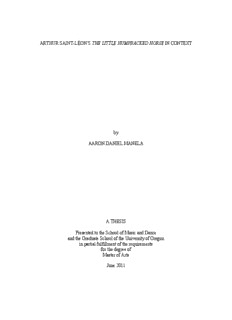
ARTHUR SAINT-LÉON'S THE LITTLE HUMPBACKED HORSE IN CONTEXT by AARON DANIEL ... PDF
Preview ARTHUR SAINT-LÉON'S THE LITTLE HUMPBACKED HORSE IN CONTEXT by AARON DANIEL ...
ARTHUR SAINT-LÉON’S THE LITTLE HUMPBACKED HORSE IN CONTEXT by AARON DANIEL MANELA A THESIS Presented to the School of Music and Dance and the Graduate School of the University of Oregon in partial fulfillment of the requirements for the degree of Master of Arts June 2011 THESIS APPROVAL PAGE Student: Aaron Daniel Manela Title: Arthur Saint-Léon’s The Little Humpbacked Horse in Context This thesis has been accepted and approved in partial fulfillment of the requirements for the Master of Arts degree in the School of Music and Dance by: Loren Kajikawa Co-Chairperson Marian Smith Co-Chairperson Anne Dhu McLucas Member and Richard Linton Vice President for Research and Graduate Studies/Dean of the Graduate School Original approval signatures are on file with the University of Oregon Graduate School. Degree awarded June 2011 ii © 2011 Aaron Daniel Manela ii i THESIS ABSTRACT Aaron Daniel Manela Master of Arts School of Music and Dance June 2011 Title: Arthur Saint-Léon’s The Little Humpbacked Horse in Context Approved: _______________________________________________ Loren Kajikawa Approved: _______________________________________________ Marian Smith In this study I examine representations of antisemitism, fantasy, and cultural imperialism in the 1864 ballet The Little Humpbacked Horse, composed by Cesare Pugni and choreographed by Arthur Saint-Léon. As the creative team adapted the story from verse to ballet, they literally morphed the titular character into new fantastical forms. They also added Jewish, Muslim, and other oriental characters and ended the ballet with a parade of the Russian nations. Drawing on the works of Richard S. Wortman, Julie Kalman, and Roger Bartra, I place these transformations in the context of a larger Russian ambivalence around the shift from a rural and woodland economy to an urban one, the inclusion of Eastern provinces in the rapidly expanding nation, and the emancipation – and inclusion of – internal minorities. I then explain how the music, choreography, and focus of the ballet change as the relevance of these mid-nineteenth century concerns fades. iv CURRICULUM VITAE NAME OF AUTHOR: Aaron Daniel Manela GRADUATE AND UNDERGRADUATE SCHOOLS ATTENDED: University of Oregon, Eugene, Oregon Brandeis University, Waltham, Massachusetts DEGREES AWARDED: Master of Arts, Musicology, 2011, University of Oregon Bachelor of Arts, Music and Physics, 1996, Brandeis University AREAS OF SPECIAL INTEREST: Music as State, Religious, and Countercultural Ritual Musicological Narrative Criticism GRANTS, AWARDS, AND HONORS: Graduate Research Award, University of Oregon, 2011 Ruth Lorraine Close Award School of Music Scholarship, University of Oregon, 2005-2006, 2006-2007 Leon Culbertson Scholarship, University of Oregon, 2006-2007 Phyllis and Lee Coffey Award in Music, Brandeis University, 1995-1996 Helen S. and Samuel L. Slosberg Scholarship Endowment in Music, Brandeis University, 1995-1996 David A. Greene ’71 Memorial Prize Endowment in Music, Brandeis University, 1994-1995 The Hanna A. Quint Scholarship Endowment in Music, Brandeis University, 1994-1995 Brandeis Undergraduate Fellowship, Studying Opera: New Approaches Teaching Assistanceship, Brandeis University, 1994-1995 Justice Louis D. Brandeis Scholarship, Brandeis University, 1992-1996 v ACKNOWLEDGMENTS I wish to express my appreciation to Professors Marian Smith, Loren Kajikawa, and Anne Dhu McLucas for their help in the preparation of this thesis. I would like extend my most sincere gratitude to my wife, Sara Prentice Manela, for her support and critical editing of this document. I also would like to acknowledge Lisa Arkin for her input on character and folk dance and Professor Halina Goldberg, Indiana University, for access to her unpublished manuscript on Jewish character dance in ballet. Access to manuscripts from the Sergeev Collection at Harvard University were made possible by a University of Oregon Graduate Research Award. v i Dedicated in memory of Jeanne Manela (1950-2000) and Robin Manela (1943-2010). vi i TABLE OF CONTENTS Chapter Page I. INTRODUCTION.................................................................................................... 1 Literature Review.................................................................................................. 10 II. THE TRANSFORMED HORSE AND THE KHIRGIZ KHAN: THE CORONATION OF TSAR ALEXANDER II....................................................... 15 III. JEWISH STOCK (CHARACTERS) FROM THE CAULDRON OF NINETEENTH CENTURY MUSIC DRAMA..................................................... 35 IV. THE CASE OF THE LITTLE HUMPBACKED HORSE AND THE DISAPPEARING DANSEUR............................................................................... 61 V. CONCLUSION....................................................................................................... 78 REFERENCES CITED................................................................................................ 84 vi ii LIST OF FIGURES Figure Page 1. The Hunchback...................................................................................................... 24 2. Music for the Khan................................................................................................ 27 3. Music for the Khan’s Wives.................................................................................. 28 4. The Millennium Monument at Novgorod.............................................................. 33 5. The Kaufmann from Lambranzi............................................................................ 38 6. Music for the Humpbacked Horse Disguised as a Jew.......................................... 43 7. Music for Panorama of Women............................................................................. 46 8. Music for the Tsar-Maiden.................................................................................... 47 ix LIST OF TABLES Table Page 1. Parade of the Russian Nations............................................................................... 31 x
Description: